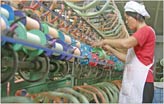Society
Moral education urged to ensure food safety
Updated: 2011-06-16 15:09
(Xinhua)
BEIJING - Experts in China have called for strengthening moral education to ensure food safety following a string of scandals in recent months.
Zhao Chenggen, an expert at the School of Government at Peking University, said on Wednesday that to promote moral education is conducive to urging food producers to place a higher value on public health.
"Moral training is a fundamental method to help ensure food safety in the long run," Zhao said.
Under the influence of moral cultivation, food producers could enhance their subjective consciousness to resist ill-gotten gains through adding toxic materials into food, he said.
"Moral decline in the food industry is more terrible than that in social communications," said another expert, Xu Yaotong, a professor of political science at the National School of Administration.
Experts' calls came after a series of food safety scandals in the country such as the steamed buns dyed with unidentified chemicals, the use of "lean meat powder", and the use of illegal cooking oil known as "gutter oil".
Courts in the country have heard 61 cases involving food safety violations and convicted 106 criminals over the past eight months, the Supreme People's Court said in May.
Police nationwide have solved more than 1,000 cases that severely jeopardized food safety so far this year.
Besides strengthening judicial means, the government has realized the importance of moral education in the food industry.
Premier Wen Jiabao said in April that the virulent food safety incidents show the degradation of morality and the loss credibility within the industry.
"A country without the improved quality of its people and the power of morality will never grow into a mighty and respected power," he said.
Wen said that advancing the moral and cultural construction would help safeguard normal production, life and social order, as well as to eradicate the stain of swindling, corruption and other illegal conduct.
Moral training has been put on the agenda in a five-year program (2011-2015) for the country's food safety education work.
According to the program, which was issued by the executive office of the food safety commission under the State Council last month, workers in the food production industry must be trained before taking the job.
Employers and their primary employees must receive concentrated training, no less than 40 hours a year, on laws, regulations, scientific knowledge and professional ethics concerning food safety, according to the program.
Moral education is considered as one of the authorities' efforts to revamp the country's food industry, which was scarred by a melamine-tainted milk scandal in 2008 that caused at least six infant deaths and sickened 300,000.
In the latest food safety scandal, drinks and food sold on the mainland but produced in Taiwan have been found to contain the toxic plasticizer DEHP.
Specials

When two are one
After a separation of 360 years, Huang Gongwang's famous Dwelling in the Fuchun Mountains has been made whole again.

Wealth of difference
Rich coastal areas offer contrasting ways of dealing with country's development

Seal of approval
The dying tradition of seal engraving has now become a UNIVERSITY major